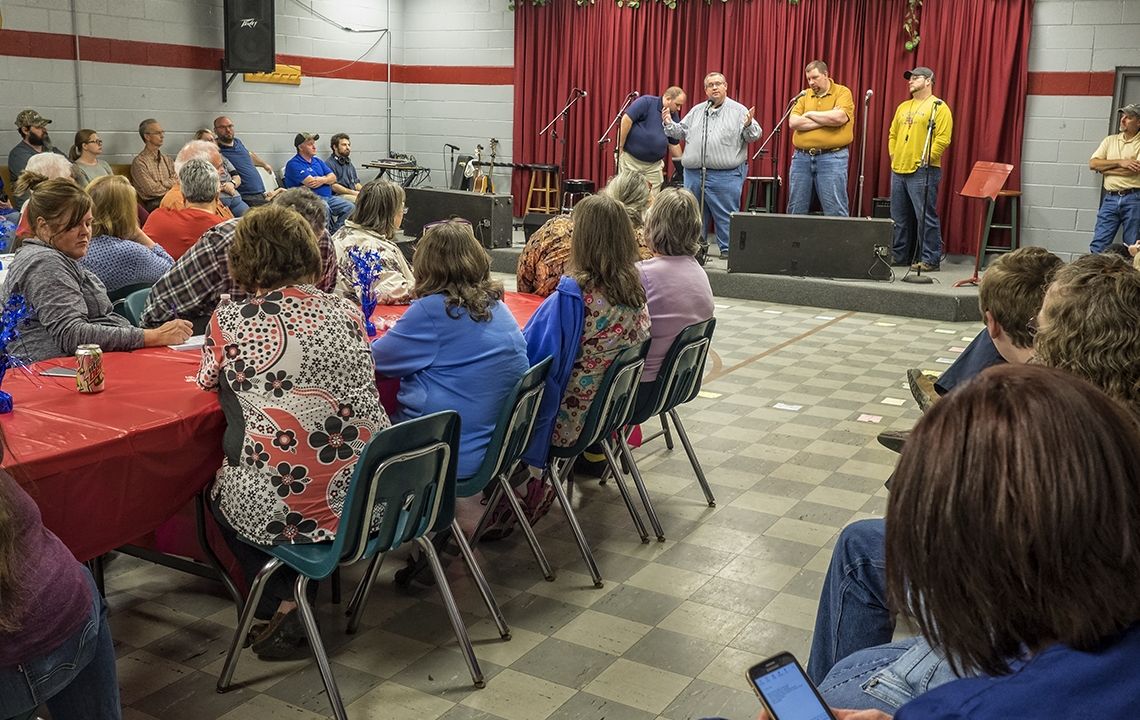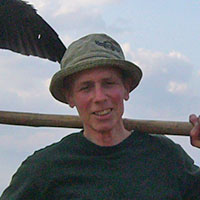
Citizens gather for Bluegrass & Broadband at a meeting of the Letcher County Broadband Board, led by Appalshop Partners. (Photo courtesy of Appalshop)
This post originally appeared at Yes! Magazine.
Nearly 50 years ago, on a presidential campaign swing through eastern Kentucky, Sen. Robert Kennedy promised to help a disabled coal miner build a community center in the tiny mountain town of Hemphill to give idle youth and others a place for recreation and meetings.
James Johnson used the brick-making machine and VISTA workers that Kennedy supplied to create community space and built a park and area for horseback riding.
Years later Johnson developed black lung disease and couldn’t keep the center going. After he died, his widow, Mabel, helped establish a new Hemphill Community Center in this mountainous region in the heart of Appalachia.
Now the Johnsons’ daughter, Gwen, is trying to save this piece of family legacy by opening a catering business inside the center, which saw operating funds diminish as tax revenues from the coal industry declined.
The network of local organizations that helped get Hemphill Catering up and running is part of an unusual form of grass roots economic development underway in this community, staggered by the collapse of coal.
It’s known as the Letcher County Culture Hub, a broad and growing collaboration of arts and media groups, for- and non-profit outfits, community organizations and government agencies that help one another survive and grow.
For example, Appalshop, a media and arts center in nearby Whitesburg, which launched the Hub, donated $5,000 in seed money to help Johnson and co-director Richard Stewart start Hemphill Catering.
Public and private operations hired them to cater events. And local media and technology company, Mountain Tech Media, created a free logo.
The Culture Hub is an incubator of sorts, where a diverse network of partners, 16 to date, share resources and connections, rather than space.
Appalshop’s Ben Fink, who moved to Kentucky in 2015 to manage the project, says it’s called the Culture Hub because “culture is at the center of all of our economic development work — both culture in terms of music, theater, film, radio, art, etc., and a culture of agency, voice, and ownership in central Appalachia.”
A community organizer, theater director and writer, Fink knows there’s a long history of efforts to save Appalachia, like the War on Poverty and the Appalachian Regional Commission. People often ask him how the Culture Hub differs from those.
“My response is always: This isn’t a project about saving Appalachia. This is a project about Appalachians saving … ourselves.”
Gwen Johnson decided to open Hemphill Catering after a neighbor complimented her on her cooking. In the first six months after she and Stewart opened the business, they cleared $2,000 in profits for the community center.
That may not sound like much, but in rural, isolated Letcher County, where the poverty rate of 33 percent is more than twice the national average, success stories like Hemphill Catering are rare.
Now, Johnson, 59, who serves as board member and secretary of the community center her mother still helps run, is going even further. She’s working with the Letcher County Farmers Market in Whitesburg to establish a satellite market at the community center.
The satellite will include the Farmacy Program, where doctors write prescriptions for fresh fruits and vegetables that residents can redeem at the market.
Health care provider Mountain Comprehensive Health Corporation, which created the program, covers the cost.
The Hemphill Community Center is just one of the Hub’s many projects. Others include an amphitheater that stages a summer drama and runs a crafts festival; a new bluegrass festival put on by several volunteer fire departments that made them $2,700 in profit last year; and revival of the oldest square dance series in Kentucky.
An industrial-scale kitchen is in the works to enable agricultural producers to scale up production and commercially package food products.
Another addition to the Hub is a housing nonprofit that aims to fund more affordable housing by encouraging a maple syrup economy in the area.
In 19 months, the Hub has created 10 to 20 new full- and part-time jobs, Fink says. To date, Appalshop has invested an estimated $150,000 to $170,000 in it, while other partners have raised nearly $30,000 in grants and partnerships.
The launch of Hemphill Catering and the success of the bluegrass festival help illustrate how Hub partners have rebounded from the loss of coal revenue to become more self-reliant and entrepreneurial—something the Hub promotes, Fink says.
They benefit in other ways, too.
They can apply collectively for grants they would be ineligible for on their own.
For example, 10 partners made a joint proposal to the regional community development bank and will receive $6,000 to $10,000 in technical assistance to build websites and commission energy audits of their buildings. They plan to retrofit the buildings to lower their energy costs.
That kind of cooperation can help address the distinct challenges facing poor, rural counties, such as spotty internet service. A mere 1 percent of Letcher County’s population has access to broadband internet, as the Federal Communications Commission defines it.
Residents complain that lack of broadband has kept them from getting paid jobs at home or selling their houses, according to the Daily Yonder newspaper. Last November, the county’s fiscal court created a seven-member broadband board, appointing two Hub members, evidence of the group’s growing reputation.
Hub partners already feel the difference. Bill Meade, chief of the Kings Creek Volunteer Fire Department, says before planning a concert, his crew checks the Hemphill Community Center’s schedule to avoid a conflict, since both cater to music fans.
— Bill Meade
Meade, 73, who can be spotted around town in an industrial work uniform calling women “honey” and men of all ages “young feller,” says the fire department advertises Hemphill’s events or announces them at department functions. “We’ve always been competitive,” he says. “Now we cooperate.”
Meade says partners also attend each other’s functions. “We have a cheering section we never had before,” Johnson says.
Hub partners have managed to sidestep their differences over politics and coal, long-standing divisions that could threaten their ability to work together.
Both Johnson’s and Meade’s families have worked in the coal industry — Johnson’s as workers and Meade’s as owners.
Today the two are on opposing sides of the fight over mountaintop removal strip mining, the practice of blowing the tops off mountains to get at coal seams. Johnson was shocked when she learned the Meades engaged in mountaintop removal, but she did not let it come between them.
Politically, Johnson thinks those in the Hub are pretty evenly divided for and against President Trump but recalls only one instance when things got tense.
That was when a critic of Trump made her feelings known during a meeting. Trump’s supporters bit their tongues.
“We are all yoked in a common struggle,” Johnson says, noting that everyone is fighting to keep their organizations financially viable and serve their communities.
The Culture Hub reflects the belief that every community has assets it can convert to economic opportunities to increase local wealth.
In eastern Kentucky, says Fink, those assets include individual enterprise, a strong work ethic, a bent for cooperation and talents for both crafts and technology, such as mechanized coal mining.
Nationally recognized quilters, square dancers and documentary filmmakers attest to these assets.
The Culture Hub is about applying those talents toward local ownership, Fink says. He contrasts that with a familiar culture in eastern Kentucky, where absentee landlords and coal companies “extract all the value out of the land and the people and ship it elsewhere,” leaving people with very little.
The Hub’s development, he says, flies in the face of conventional thinking around how development works. “The prevailing view is that culture is decorative and peripheral, and economic development means bringing in factories,” he says.
The Culture Hub may already be changing that way of thinking. It has hosted two events that drew people from across the country. Additionally, Fink and other Appalshop staff have made presentations at national forums, including Creative Placemaking: The Role of Arts in Community Development, held in Washington, DC, last December.
What’s more, the Hub has been selected as a national test site for PolicyLink’s Arts, Culture and Equitable Development initiative.
Efforts are underway to write a culture hub training curriculum for other poverty-stricken Kentucky communities and Hub staff have been meeting with other organizations in Kentucky and nationwide to encourage creation of other culture hubs.
“This model could certainly work in the Black Belt or Mississippi Delta or anywhere … where there’s marginalized rural populations … who have a lot of knowledge and resilience and a commitment to their neighbors and places,” says Shaunna Scott, Appalachian studies director at the University of Kentucky.
But other experts point to the Hub’s limited reach as a model for economic development. The Culture Hub could never replace all the coal jobs lost or match their wage levels, says Anthony Flaccavento, a consultant in sustainable development.
Yet, he adds, it could be an important part of the economy, creating buzz and new energy and inspiring entrepreneurship. “I think that’s pretty critical, because right now people are somewhere between desperate and totally depressed in many coalfield communities,” he says.
Culture Hub partners have started forming “sub-hubs” for long-term planning to meet local needs. One sub-hub focuses on food, another on people’s energy costs. The partners are ambitious, Johnson says, and want to tackle “everything from the bottom to the top in this county.”




